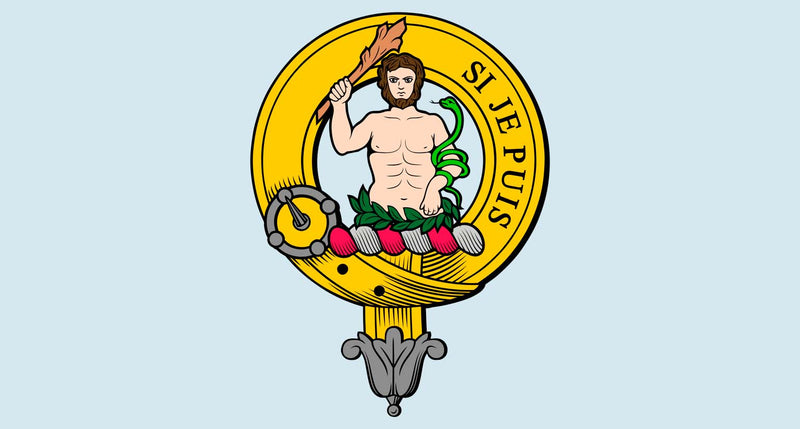Livingstone Clan Crest Crest Description: A demi savage, wreathed about the head and middle, holding in the dexter hand a club erect, and, in the sinister, a serpent, all Proper Livingstone Coats of Arms: A note on Coats of Arms: Under Scottish heraldic law a coat of arms is awarded to an individual (with the […]
Tag Archives: Livingstone Crest & Coats of Arms
Livingstone Clan Crest
Crest Description: A demi savage, wreathed about the head and middle, holding in the dexter hand a club erect, and, in the sinister, a serpent, all Proper
Livingstone Coats of Arms:
A note on Coats of Arms: Under Scottish heraldic law a coat of arms is awarded to an individual (with the exception of civic or corporate arms) . There is no such thing as a ‘family coat of arms’ The arms represented below are personal arms (with the above exceptions). Only the individual granted these arms has the right to use them. for more information see our pages on heraldry here: (https://tartanshop.com/pages/all-about-scottish-heraldry)
LIVINGSTONE (plain)Argent, three gillyflowers (cinquefoils), Gules, within a double tressure, flory counterflory, Vert.
The Achievement (as a Coat of Arms is correctly termed) of Niall Livingstone of Bachuil.The ShieldIn the West Highlands of Scotland shields bore symbolic charges which illustrated the bearers ancestry.The Lion RampantIn the back of his splendid book The Highland Clans, the late Sir lain Moncreiffe of that Ilk charted the use of the Lion Rampant by various families whose common origins lie in the Kingdom of Scottish Dalriada.Alastair Campbell of Airds, Unicorn Pursuivant of Arms, thinks “there is little doubt that the Lion is used as a reference to the Royal Line of the Sons of Erc, Fergus, Loam and Angus who moved across the North Channel in around 500 AD and established a major extension of Irish Datriada in what is now Argyll.” From his article on West Highland HeraldryThe SalmonAlastair Campbell continues “This is a most mysterious symbol and one which is clearly of great importance. Salmon appear frequently in early Celtic mythology as a symbol of Wisdom and Knowledge. They are also a symbol of eternity with their mysterious return to their birthplace from the outermost ocean where they recommence the life cycle – also for their strength and beauty. Their Knowledge springs from their having eaten the red hazel nuts of Wisdom that fall into the water of the sacred wells from the hazel trees that surround them – the red spots on the salmon’s belly derive from this.Clearly it is a powerful symbol. To my mind there is a pagan feel to it; I do not think it is the txoua of early Christianity and wonder if it is not a reference to the Old Religion of the Celts, or more accurately, to a person or family connected with it. “The HandI am not certain that I agree with Alastair’s view of the meaning of the hand. I believe that the hand represents the ancient symbol of the derbhine, the true family, and its use, like the Lion Rampant alludes to Royal ancestry. It appears in different guises -on its own, holding a cross, sometimes even a heart or a dagger.The Coarbs of St Moluag use a hand holding the blue cross crosslet fitchee – this is born by the Macleans of Duart (who descend from an Abbot of Lismore), the MacNaughtons and a few other families.In conjunction with the Red Cross it implies a connection with St. Columba himself a scion of the O’Neills – The O’Donnell being the Coarb and Chief of the Kindred of St. Columba.I was told recently that the cross crosslet fitchee is used as a symbol of evangelism and Moluag was famous for founding a hundred monasteries, mostly amongst the heathen Picts of Albany.SupportersSupporters are a mark of considerable distinction and honour and are generally granted only to Peers, Knights of the Thistle or Grand Cross, Barons (pre 1587) and Chiefs of old clans. We are very privileged to have these well dressed stags as supporters. Supporters stand on a compartment which in our case is strewn with Moluag’s favourite flower, the flower of the grass of parnassus which grows abundantly on Lismore. It is the most beautiful and delicate flower.The ChapeauThe Chapeau is now used as the “Coronet” of a baron. Crown Baronies are furred ermine. Baronies of the old earldoms or Lordship of the Isles are furred contre-ermine. Ours is unique – Vair or squirrel fur, as it is held by the Grace of God.The CrestThe crest shows St Moluag with his golden “circle of glory” holding aloft his crozier – the Bachuil Mor in his right hand and the blue cross-crosslet fitchee in his left hand.Croziers in SaltireWe have been granted a very notable distinction of two croziers crossed in saltire behind the shield representing the golden cased Bachuil Mor, the Great Staff of St Moluag, as the insignia of the Barons of the Bachuil, as Coarbs of St Moluag and Heritable Keepers of the Bachuil Mor.RobeIn the warrant the blazon refers to “his baronial mantle Gules doubled of silk Argent, fur-edged of miniver and collar Ermine and fastened on the right shoulder by five spherical buttons Or” however as the achievement would be rather cluttered we have elected NOT to show the robe.

